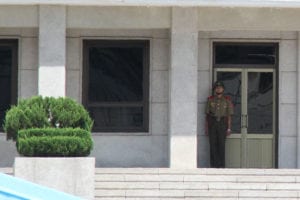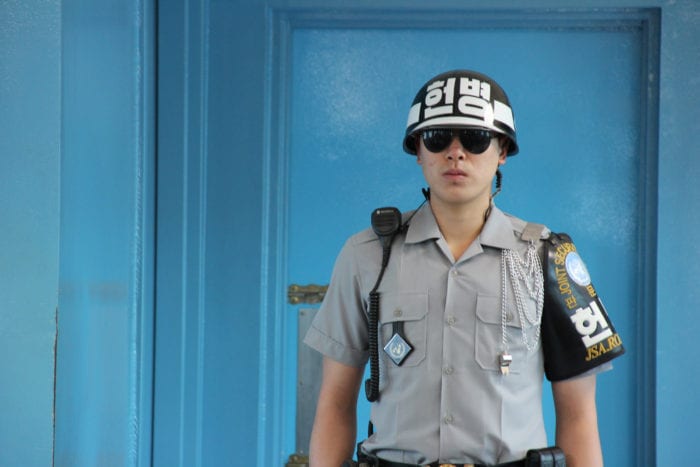By Kyle Barr

In the summer of 2016 I traveled to South Korea with the Stony Brook University’s program Journalism Without Walls. Though three weeks is never enough time to entrench yourself into a culture, I got to see a lot of what Korea is, and what it isn’t.
We traveled to the Demilitarized Zone, the DMZ, between North and South Korea. We learned of the minefields of the surrounding area hiding behind lines of barbed wire, the towers above the fields that could watch down into the North. Soldiers took us to the Military Demarcation Line in between two buildings, one owned by the North and one owned by the South. There are three small blue houses where the two sides are supposed to speak, but they haven’t for years. There’s a lone North Korean soldier on the far side beyond the line. He stood there at attention up the large stone steps. The atmosphere is oppressive, as if the air sits heavy on the shoulders.
But it’s a tourist spot. It’s a place with a gift shop and where a good many tourism companies run buses to all the major sites. Kids are often taken there, mainly from the schools in Seoul. The South Korean tour guide wanted us to take pictures of the North Korean soldier all at the same time like everyone with a camera was a private with a rifle at a firing line. The DMZ is a tool as much as much as it is a contested piece of real estate. The South Korean government wants you to come, it wants to convince you that everything you see is important.
South Korea is suffused with modernity. From up on the top of Dongguk University in Seoul, where my group and I stayed, the night skyline buzzed with color and light. The streets were clean even through the bustle, as it was a cultural tick for people to pick up garbage even when it wasn’t theirs. The subways were a masterwork of clean efficiency. Electric signs told when the next train was coming, and it was always exactly on time. I think Seoul is the most modern place I have ever been to in my life.
When I originally told my parents I wanted to go there, when asked they couldn’t even find South Korea on a map. Worse, my folks heard the word “Korea” and their eyes went wider than if they had seen a car crash 2 feet in front of them. Korea, to them, was a place of great anxiety, where a madman holding a big red button threatened everything they knew. My mother actually thought it could be possible that I would be walking around Seoul, get lost, then accidentally end up on the other side of the border in North Korea, suddenly finding myself surrounded by armed soldiers.

A year ago I didn’t have to fear for my life, of course, but now things are different. Seoul is only a short 35 miles from the DMZ. Along the border in entrenched positions there are thousands of artillery positions well dug in and lined up within easy range of Seoul. Any sort of conflict that erupts, whether from a huge, planned military endeavor or sudden strike, could result in a staggering number of casualties.
I spoke to a few young people originally from North Korea who braved so much hardship to escape to the South, with their parents hiring brokers that would ferry them across harsh terrain into China, and from there a looping path through several countries before they could seek asylum in the South. The people living in the North are destitute and much of the country relies on foreign aid. While some buy fully into the propaganda displayed by the Kim Jong-un government, many are at least in some part disbelieving.
These are the people that we ignore when United States officials talk about a confrontation with North Korea. Not only do they not want conflict, much like us in the U.S, but they and people in the surrounding countries and territories like Japan and Guam are stuck dealing with a conflict between two nuclear powers. In the expression of our fear, it’s imperative that we don’t forget these people who are left in the crosshairs.
Kyle Barr is currently an intern for TBR News Media.







